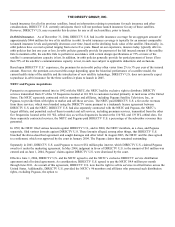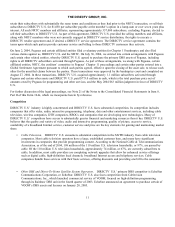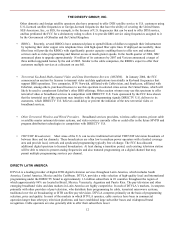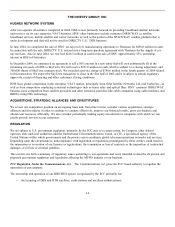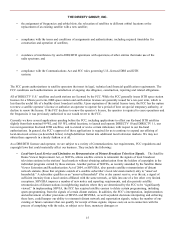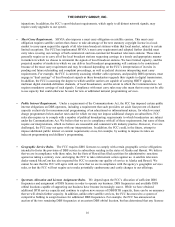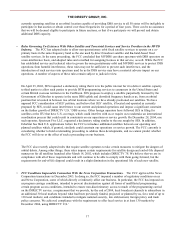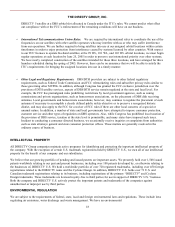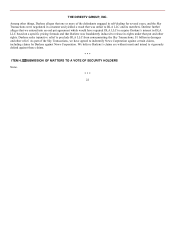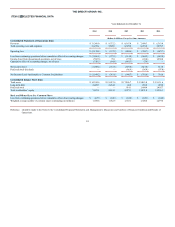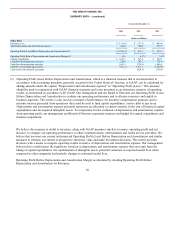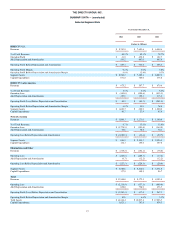DIRECTV 2004 Annual Report Download - page 27
Download and view the complete annual report
Please find page 27 of the 2004 DIRECTV annual report below. You can navigate through the pages in the report by either clicking on the pages listed below, or by using the keyword search tool below to find specific information within the annual report.
THE DIRECTV GROUP, INC.
DIRECTV 5 satellite at a DBS orbital slot allocated to Canada under the ITU’s rules. We cannot predict what effect
our compliance with or the FCC’s enforcement of the remaining conditions will have on our business.
•
International Telecommunications Union Rules. We are required by international rules to coordinate the use of the
frequencies on our satellites with other satellite operators who may interfere with us or who may suffer interference
from our operations. We are further required to bring satellites into use at our assigned orbital locations within certain
timeframes in order to enjoy protection from interference caused by systems licensed by other countries. With respect
to our FCC licenses to operate Ka-band satellites at the 99 WL, 101 WL, and 103 WL orbital locations, we must begin
regular operations at each location by June 25, 2005 in order to preserve our international priority over other systems.
We have nearly completed construction of the satellites intended for those three locations, and have arranged for three
launches scheduled during the spring of 2005. However, there can be no assurance that we will be able to satisfy the
ITU’s requirements for bringing the assigned locations into use in a timely manner.
•
Other Legal and Regulatory Requirements. DBS/DTH providers are subject to other federal regulatory
requirements, such as Federal Trade Commission and FCC telemarketing rules and subscriber privacy rules similar to
those governing other MVPDs. In addition, although Congress has granted the FCC exclusive jurisdiction over the
provision of DTH satellite services, aspects of DBS/DTH service remain regulated at the state and local level. For
example, the FCC has promulgated rules prohibiting restrictions by local government agencies, such as zoning
commissions and private organizations, such as homeowners associations, on the placement of DBS dish receiving
antennas. Local governments and homeowners associations, however, may continue to regulate the placement of such
antennas if necessary to accomplish a clearly defined public safety objective or to preserve a recognized historic
district, and may also apply to the FCC for a waiver of FCC rules if there are other local concerns of a special or
unusual nature. In addition, a number of state and local governments have attempted to impose consumer protection,
customer service and other types of regulation on DBS operators. Also, while Congress has prohibited local taxation of
the provision of DBS service, taxation at the state level is permissible, and many states have imposed such taxes.
Incident to conducting a consumer directed business, we occasionally receive inquiries or complaints from authorities
such as state attorneys general and state consumer protection offices. These matters are generally resolved in the
ordinary course of business.
INTELLECTUAL PROPERTY
All DIRECTV Group companies maintain active programs for identifying and protecting the important intellectual property of
the company. With the exception of certain U.S. trademark registrations held by DIRECTV U.S., we own all of our intellectual
property for the benefit of our company and our subsidiaries.
We believe that our growing portfolio of pending and issued patents are important assets. We presently hold over 1,500 issued
patents worldwide relating to our past and present businesses, including over 100 patents developed by, or otherwise relating to
the businesses of, DIRECTV U.S. We hold a worldwide portfolio of over 720 registered trademarks, including over 450 foreign
registrations related to the DIRECTV name and the Cyclone Design. In addition, DIRECTV U.S. holds over 73 U.S. and
Canadian trademark registrations relating to its business, including registrations of the primary “DIRECTV” and Cyclone
Design trademarks. These trademarks are licensed royalty-free to third parties for use in support of DIRECTV U.S.’ business.
Both the company and DIRECTV U.S. actively protect the important patents and trademarks of the companies against
unauthorized or improper use by third parties.
ENVIRONMENTAL REGULATION
We are subject to the requirements of federal, state, local and foreign environmental laws and regulations. These include laws
regulating air emissions, water discharge and waste management. We have an environmental
18




